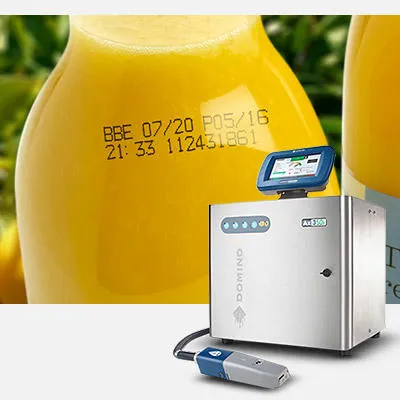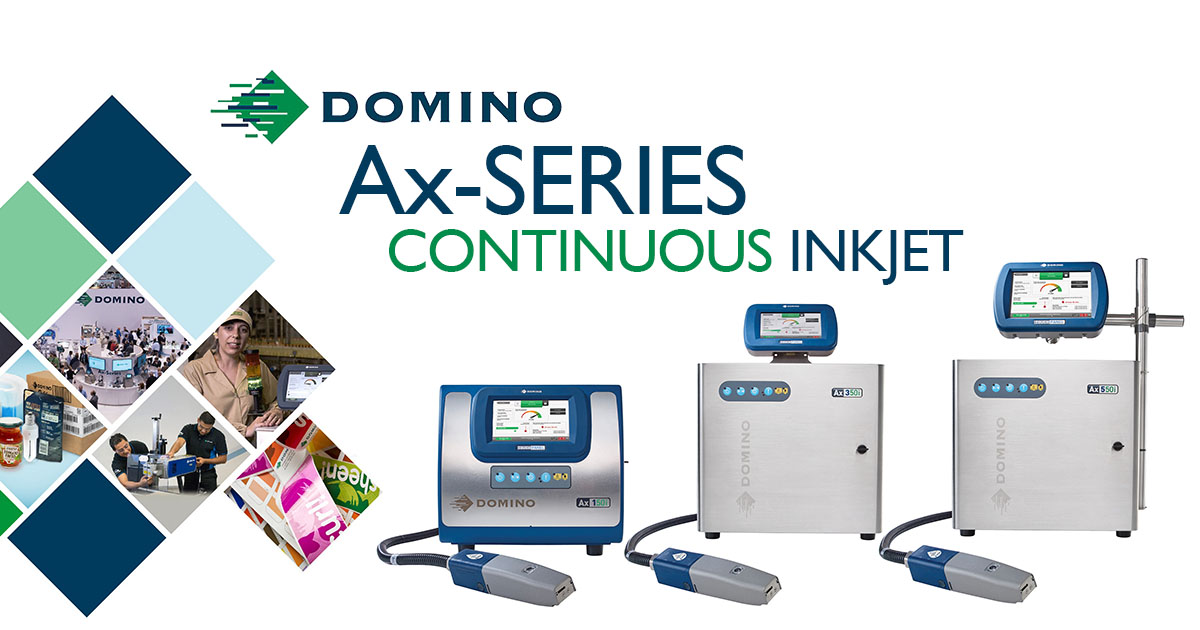The working principle of an inkjet printer
Inkjet printers are the most common type of printers used today. Two main methods can be distinguished: drop-on-demand (DOD) and continuous inkjet (CIJ) technologies.
Dod printers work by expelling tiny ink droplets, one drop at a time, with each drop precisely placed onto the substrate.
Continuous inkjet printers expel ink from the print nozzles in a continuous, steady flow.
Typical substrates suited to inkjet printing include paper, films, metal, plastics, and many other materials.

A closer look at CIJ printing
An industrial Continuous Inkjet ( CIJ ) printer is used for coding and marking products and packaging during production and packaging processes. Mainly variable data is printed; typical applications include expiry dates, batch and production information, serial numbers, and promotional codes.
CIJ printing is a non-contact, versatile solution for these use cases, providing high-quality, reliable coding on fast-paced production lines. By reliably coding each product they can help to ensure high overall equipment effectiveness (OEE).
Among Continuous inkjet printers, Domino’s Ax-Series are a preferred choice. They are simple to install, extremely versatile, and able to print on a wide range of product materials. Ax-Series printers deliver outstanding coding on a wide range of products and substrates. Common applications include bottles, cans, sachets, films and foil, pipes, profiles, cable and wire.

CIJ is short for continuous inkjet. In a CIJ printer, ink is pumped from an ink reservoir and ejected through a nozzle that creates a jet of ink.
The jet of ink is then broken up into a large number of ink droplets through high frequency vibration. Once the droplets are formed select droplets are charged by electrodes. The stream of droplets then passes through deflector plates which create an electrostatic field.
The charged drops are deflected as they move through the deflector plates, to be ejected from the print head and placed on the product to form the required message. Uncharged drops are not deflected and return into the CIJ ink system.
Through this printing process the solvent base of the ink will evaporate, changing the ink’s viscosity. To ensure the optimum drop formulation the viscosity must be tightly controlled to a defined value.
Domino Ax-Series CIJ printers have a built in viscometer to continually measure the ink viscosity. Based on this measurement the Ax-Series printer will automatically instigate addition of solvent (make up) to the ink to ensure it is at the correct viscosity level at all times.
No Continuous printing without ink
Ink is significant in overall print quality; correct ink selection is therefore imperative. In order to provide consistent code quality, an ink must adhere to a substrate correctly and deliver sufficient contrast and durability.
If the ink smudges or delivers low contrast this can lead to rejected codes or even costly product recalls.
At Domino, we develop and manufacture inks that are specifically suited to individual materials, production processes, and substrates. Specialist inks are designed to withstand harsh post-print processes and last the life of the product.
Our CIJ inks come in a variety of colours to provide maximum contrast on a widest range of surfaces. Domino’s ink portfolio includes MEK-free, highly pigmented and direct food contact options as well as speciality inks for many industry specific requirements.
CIJ Printer Flexibility as standard
Flexibility as standard Some characteristics of the continuous inkjet (CIJ) printer make it extremely versatile and suitable for coding and marking in many industries. Typical applications are found in the food, beverage, pharmaceutical, healthcare, beauty, cable and wire, and industrial markets.
- CIJ printers do not need to come in contact with the product when coding onto it. Ink drops are deflected from the print head and land on the product as it passes the print head. This makes CIJ printers a good choice for coding breakable products
- Continuous Inkjet (CIJ) print heads are mounted at a distance from the product. This distance is flexible, which allows for printing onto curved or uneven surfaces. If you need to code on cans, bottles, or pipes a CIJ printer can be an ideal solution.
- CIJ print-heads can utilise a wide variety of specialty inks to accommodate a multitude of applications:
- Heavily pigmented white and yellow inks for cables, automotive parts, and tires.
- Heat resistant inks for applications that need heat-treatment post printing.
- Inks specifically developed for the food industry, to ensure legal compliance when coding direct-food-contact packaging or egg shells.
- Domino’s CIJ printers are designed to withstand harsh washdown procedures through IP65/66 compliance and optional 316 stainless steel cabinet. They print reliably in hot, cold, wet, and sticky environments – such as those encountered in the beverage industry.
Integrated Continuous Inkjet (CIJ) solutions
Integrated solutions in today’s production environments, printers need to be capable of more than just printing; Domino’s Ax-Series range of CIJ printers offer manufacturers:
- Leading industrial communication protocols to simplify installation and production line automation.
- Automation and integration with vision systems help to reduce human errors.
- Industry 4.0 and cloud connectivity to ensure you get the most of your coding solution.
- Remote monitoring to make you aware of coming problems before they actually cause disruption.
Domino has more than 40 years experience in developing award-winning industrial inkjet printers. One of the key industry leaders in coding and marking, Domino has set the industry standard for print quality, reliability, and versatility.